FAQ: MSN in Nursing Administration

Rapid changes are happening in the healthcare industry, driven by advances in technology and the shift to value- and outcome-based models for patient care. Nurse leadership is evolving too. Many RNs are now upgrading their skills to compete for the best jobs in management, and a Master of Science in Nursing (MSN) is often the key to getting ahead. The scope and versatility of the MSN in Nursing Administration makes the degree a popular choice for RNs seeking a career in leadership.
Whether you want to supervise a hospital care unit, direct nursing operations for an outpatient clinic, or oversee an entire healthcare system, an MSN in administration can give you the right skill set to meet the demands of the job. Nursing leaders are adept planners, strategists, collaborators and innovators who can critically evaluate complex challenges. MSN-prepared RNs understand this well. They are suited to a variety of roles in the new landscape of healthcare where results are also measured in patient satisfaction, and leaders must be as good at listening as they are at taking charge.
Online MSN programs are making it easier than ever for nurses to earn a master’s degree in nursing administration while still working full time. Explore the links below to learn more about management and executive careers for nurses and how an online MSN degree can prepare you to lead.
What Is a Master of Science in Nursing Administration?

A Master of Science in Nursing in Nursing Administration is a degree for RNs seeking a comprehensive education in healthcare management and leadership. MSN graduates have the big-picture perspective that’s required to excel in every aspect of administration, from finances and personnel to quality measurement and improvement.
An advanced degree in nursing admin can also help you pursue career opportunities in a diverse number of fields outside of direct patient care, including public health, nonprofit leadership, clinical research, or corporate and hospital consulting.
Lamar University’s MSN in Nursing Administration online is designed for working RNs who need a flexible, affordable way to earn their master’s degree. The program is tailored to students seeking a chief nurse, director or executive position, but is also beneficial for RNs interested in other roles. With courses in management theory, practice and policy — as well as marketing and informatics — the degree offers students a thorough education in healthcare administration that can be completed in as few as 24 months.
Why Should I Consider an MSN in Nursing Administration?
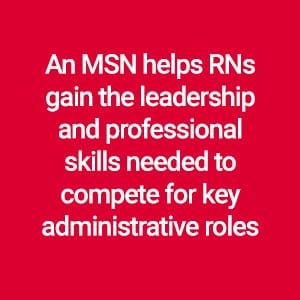
Career advancement is the most common reason RNs give for completing a master’s degree in nursing administration. Earning an MSN benefits nurses at any stage in their professional development, however. What you learn in an MSN program can help you understand nursing’s wider reach beyond the bedside and into the community. You’ll also begin to see the impact that individual RNs can have on the facilities and systems in which they work.
It might be a good time to consider an MSN in administration if you are:
- Ready to explore your career options in nurse leadership
- Interested in becoming a chief nursing officer or director
- Experienced in nursing management but finding it difficult to compete for open positions without an advanced degree
- Seeking additional education to enhance your performance in your current leadership position
- Required to earn a master’s degree by your employer either for your current job in administration or to receive further promotions and pay raises
- Preparing for a career as a healthcare executive or updating your knowledge and skills for the executive role you currently have
- Planning to pursue a doctoral degree in nursing and ready to take the first step on that path

“Don’t wait for the right time to go back to school or you’ll never do it. You’ve just got to do it and make the time right.”
– Dr. Ruthie Robinson, Lamar University Director of Graduate Nursing Studies
What Will I Learn?

You’ll study many different facets of nursing administration in an online MSN program to learn how effective leadership benefits patients as well as the systems that provide their care. Courses address core management areas such as operations, planning, finances and personnel, in addition to research, technology and quality control.
Lamar University’s online MSN in Nursing Administration features 37 credit hours of coursework covering the following elements of healthcare leadership:
- Research and evidence-based practice in administration
- Government health policy and funding streams
- Budgeting, accounting and financial analysis
- Health IT and informatics
- Quality standards, measurement and improvement
- Personnel recruitment and management
- Organizational planning, strategy and systems theory
- Healthcare marketing
By completing two practicums at the end of the MSN program, Lamar University students put their new skills into practice under the supervision of an experienced healthcare administrator.
Spotlight: Marketing in Nursing Administration

- Public advertising campaigns and recruitment programs targeting nurses and physicians
- Appeals targeted to service members in transition who may want to pursue a VA healthcare career after discharge
- VA career outreach programs and promotional efforts at the local, state and regional level
- Marketing efforts that promote VA career benefits at professional conferences and through visits to college nursing programs
What Are the Admission Requirements for Online MSN Programs in Nursing Administration?
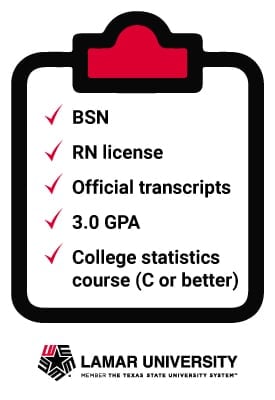
Check with MSN programs you are interested in for their specific admissions criteria as requirements can vary significantly by school, and sometimes they change. Most online master’s programs in nursing administration request that applicants have all of the following in order to be considered:
- An active and unencumbered nursing license
- A Bachelor of Science in Nursing (BSN) from an accredited school or degree program
- Official transcripts (from each school attended) that verify the applicant’s GPA
- A grade of C or better on a college-level statistics course or credit-by-exam in statistics
Lamar University’s online MSN in Nursing Administration requires that applicants submit an online application in addition to documentation of all of the above. However, the program does allow some flexibility on the statistics requirement. Students can be admitted without a college-level statistics course, but they will need to complete the class before enrolling in Nursing Research. Applicants must also have a GPA of 3.0 or higher for the last 60 hours of college coursework. See the full list of admission requirements for further details.
Will I Have to Take the GRE?
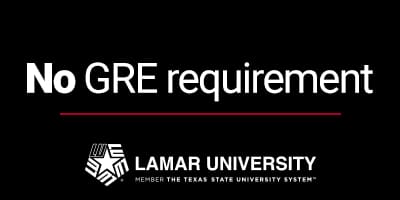
It depends on your MSN program. Admission policies vary, so be sure to check testing requirements for the schools you’re considering.
The GRE is not required for admission to Lamar University’s MSN in Nursing Administration online program.
What Is Nursing Program Accreditation?
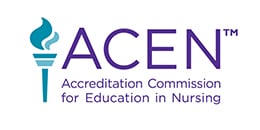
According to the U.S. Department of Education, accreditation is both a process and a seal of approval. It indicates that an academic program is qualified to offer nursing degrees. An independent higher education authority reviews a nursing program’s teaching methods, faculty qualifications and financial practices, as well as the resources and results delivered for students. For example, accreditors look at pass rates for RN certification exams and the number of students employed in their degree field after graduation.
The accreditation process is just as rigorous for online nursing programs as it is for those on campus. It helps ensure that all students get an education that is academically sound and relevant to current employment standards in healthcare. As ThoughtCo notes, accreditors also verify that online programs are financially stable and that your school is not a diploma mill.
Lamar University’s MSN in Nursing Administration is accredited by the Accreditation Commission for Education in Nursing (ACEN). The university and its degree programs are also regionally accredited by the Southern Association of Colleges and Schools Commission on Colleges.
Does Accreditation Matter to Employers?

Yes. Earning your MSN from an accredited nursing program is not only a good idea, it’s the best thing you can do for your career.
Few healthcare employers accept job candidates for management or leadership positions who have graduated from an unaccredited nursing program. That means your chances of advancement in nursing administration are slim to none without the endorsement of quality that degree program accreditation provides.
Does Accreditation Affect Financial Aid?
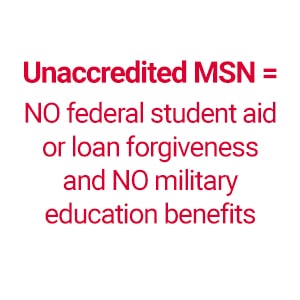
Yes, and this is another good reason to do your research before considering an unaccredited nursing program, particularly for a master’s degree. You’ll find that most state, federal and military aid options available to fund your MSN require that you study in an accredited program.
If you decide to go for your doctorate at some point in the future, you’ll also have difficulty finding a credible doctoral program that will accept an unaccredited MSN for admission. And if you plan to apply to a loan repayment or loan forgiveness program for RNs after graduation, you may be out of luck as well — as FedWeek confirms, funds borrowed for a degree from an unaccredited school or program do not qualify under federal guidelines and most state eligibility guidelines.
How Can I Tell Whether Online Colleges and Universities Are Accredited?
- The U.S. Department of Education’s Database of Accredited Postsecondary Institutions and Programs
- ACEN’s Accredited Nursing Programs database
- CCNE’s Accredited Baccalaureate and Graduate Nursing Programs database
Will I Have to Do Clinicals for an MSN in Nursing Administration?
Most MSN programs require practice experience in the form of a practicum and/or internship, which will not resemble the clinicals you did for your initial RN license or BSN degree.
Practice experience in nursing leadership prepares you to take on a professional role that requires management skills rather than those you already use in direct patient care.
The goal is to prepare you for the broader duties of an administrator or nurse executive.
What’s a Nursing Administration Practicum Like?

Each online MSN program has its own approach to this element of your master’s education and its own definition of a practicum. It may involve an administrative internship in a healthcare setting, supervised by a qualified professional with leadership experience. Regardless of the format, experiential learning opportunities like these can help you gain essential skills in administration and understand the work of leadership from the inside out.
MSN students at Lamar University complete two distinct Administration Practicum courses, requiring 160 hours on-site at a hospital in their local community:
- In MSNA 5221 (15 weeks – 96 hours), students gain experience planning and organizing healthcare delivery, while applying their knowledge of systems theory and strategies for midlevel change. They also complete a nurse executive summary paper that responds to an organizational problem or issue of interest.
- In MSNC 5232 (8 weeks – 64 hours), the focus is on quality improvement for human resources, as students apply new models for success and collaborate with healthcare HR professionals. They have the opportunity to propose an administrative innovation project as well.
Each practicum also features ongoing peer-to-peer discussions, and weekly reflective journal entries that chart students’ progress in meeting course outcomes.
“I really enjoyed the synthesis project … It was an exciting part of the program. It definitely motivated me to lean toward the career that I’m in now.”
Do I Choose My Own Practicum Site, or Will My MSN Program Do It for Me?
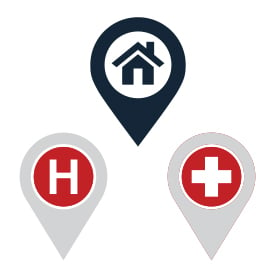
Online students generally make the arrangements for their own administration internship or practicum site in consultation with their MSN professors. Many programs allow students to complete their practice experience where they currently work. You can also choose a site that’s different if you are interested in learning more about career options in other areas of healthcare, or you are thinking about working in the government or nonprofit sector.
All Lamar University students do their practicums in a hospital setting unless a different site has been approved by the MSN program’s graduate director. RNs who choose to do one or both practicums at their current workplace are also advised to find a different preceptor than their present work supervisor. Check with the program directly for further details.
What Qualifications Should My MSN Preceptor Have?

Your MSN program will have guidelines you can follow in choosing a preceptor, and a professor will also need to approve the person you pick. However, there are some common qualifications to look for.
Most nurses who serve as preceptors have an MSN in administration or another advanced degree and currently hold a leadership position in their organization. It’s also important to find someone with knowledge that matches what you hope to learn through your practicum or internship. For instance, you might look for a preceptor skilled in project management, budgeting, marketing, analytics or other areas of administration that interest you.
How Will an MSN in Nursing Administration Advance My Career?

RNs often find that having a master’s degree helps them advance in many different areas of their career. MSN RNs are more competitive for promotions and pay raises. They also qualify for a wider range of jobs in management. Earning your MSN can even open a path to some of the most sought-after positions in nursing administration, such as the chief nursing role at a Magnet hospital recognized by the American Nurses Credentialing Center (ANCC).
MSN RNs aiming for the upper ranks of healthcare leadership also have a special advantage over BSN RNs chasing the same goal — a graduate degree is required to qualify for the Nurse Executive Advanced Certification (NEA-BC) exam. The NEA-BC is the highest administrative certification issued by the ANCC, and a host of career benefits can come to those who earn it.

“I really enjoy helping nurses get higher degrees and seeing the changes it makes in them. Everything we do to improve ourselves as nurses helps improve the quality of care we can provide our patients.”
What Can I Do With an MSN in Nursing Administration?

MSN RNs have more freedom to follow their ambitions in nursing and explore their interests. Whether you’re seeking your first management or supervisory position or you’re already a nurse leader, a master’s degree can pay benefits in both career choice and mobility.
If you want to stay on the front lines of patient care, you might take charge of a hospital unit, or supervise nurses in another manner. You can also manage areas of care support, such as a diagnostic services team or a patient advocacy program. If you’re ready to also go farther, you might be the right person to oversee a hospital-wide initiative, or eventually lead your entire healthcare organization from the C-suite.
Administration careers in the community are also more accessible with an MSN. You may be interested in running an outpatient treatment center or a long-term care facility, working as a healthcare consultant or managing a city health program, for instance. Having a master’s degree can help you continue rising through the ranks of any healthcare field.
You can even launch your own business. According to the National Nurses in Business Association, entrepreneurs are 125% more successful if they start a new venture in an industry they understand through firsthand work experience.
What Is the Career Outlook for Graduates of MSN Nursing Administration Programs?
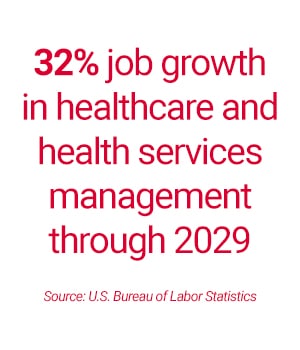
According to the U.S. Bureau of Labor Statistics, healthcare employment growth will surpass that of every other American industry through 2029. Demand for medical and health services managers is on the rise in particular, and the BLS predicts jobs in this area will grow 32% over the same period.
Financial consulting firm Deloitte’s 2021 Global Healthcare Outlook report also argues that the recent transition to consumer-focused care models, telemedicine and Covid19-driven safety protocols requires leaders who are ready to adopt new technologies and ways of working. This is good news for MSN nurse administrators prepared with the knowledge and skills needed to lead in this era of change. The BLS suggests that administrators with expertise in health IT and informatics are likely to benefit as well.
Spotlight: Demand for Nurse Leaders in Texas and Louisiana

How Do MSN RN Salaries Compare With BSN RN Salaries?
According to April 2021 job market data from ZipRecruiter, the average nursing salary is $88,434 for BSN RNs and $105,867 for MSN RNs.
ZipRecruiter‘s breakdown of typical BSN vs. MSN salaries by state also illustrates the variance you’ll find in different regions of the country.
| State | Average Base Salaray BSN RNs | Average Base Salary MSN RNs |
|---|---|---|
| New York | $92,313 | $110,510 |
| Virginia | $90,820 | $108,723 |
| Pennsylvania | $79,843 | $95,582 |
| Texas | $78,268 | $93,696 |
| Tennessee | $76,773 | $91,908 |
| Louisiana | $74,556 | $89,253 |
| Alabama | $73,138 | $87,555 |
| Florida | $70,584 | $84,497 |
Averages don’t tell the whole story of course, because your nursing experience, certifications and qualifications can figure into your salary too. It’s clear, however, that RNs with a master’s degree have the edge when it comes to earnings.
Which Nursing Administration Jobs Pay the Most?
BLS reports that median pay for managers in the medical and healthcare field is $104,280. RNs who join the executive ranks can earn substantially more. April 2021 salary data from PayScale indicates that board-certified nurse executives average $133,628 per year in base salary. This does not include the performance incentives and bonus pay that many in leadership positions enjoy.
The salaries below reflect average pay for some of the key management roles MSN-prepared administrators can pursue, nationally and by city in Texas and Louisiana.
| Position | Average Annual Salary | Texas | Louisiana |
|---|---|---|---|
| Chief Nursing Officer | $136,250 | $141,600 Dallas | $133,184 Lake Charles |
| Clinical Trials Manager | $131,393 | $123,783 Austin | $132,042 New Orleans |
| Hospital Chief Operating Officer | $125,457 | $134,426 Odessa | $119,654 Monroe |
| Operating Room Nurse Manager | $121,336 | $109,176 Fort Worth | $118,615 Shreveport |
| Practice Director | $114,833 | $129,710 Midland | $106,534 Lafayette |
| Clinical Data Manager | $110,094 | $109,992 Irving | $97,073 Baton Rouge |
| Nursing Home Administrator | $106,184 | $101,192 Beaumont | $93,540 Metarie |
| Hospice Director | $102,714 | $98,677 Houston | $94,044 Houma |
MSN graduates are more competitive for these and other well-paying leadership positions, especially in high-stakes areas of nursing such as acute care and oncology.
Do Military Nurses See Career Benefits With an MSN?

Yes. The U.S. Army, Navy and Air Force nurse corps all value RNs with an MSN degree. Whether you are an active or reserve RN, a master’s in nursing administration can help you become eligible for higher pay grades and promotions in your branch of service.
A master’s degree can also benefit civilian nurses who want to work in the VA health system or who are ready to move up to nursing administration there. MSN RNs can even apply to the Pathways and Presidential Management Fellows programs. Each provides nurses with ongoing career mentorship and opportunities for advancement within the VA hospital and healthcare network.
How Much Does an Online MSN in Nursing Administration Cost?

The average tuition rate for an online master’s in nursing administration is $701 per credit hour or $2,103 for a three-hour course. Actual costs can vary, however. A number of MSN programs charge tuition in the $500-$600 range per credit hour, and you’ll also see rates as high as $1,738 per credit, even for in-state students.
If you’re on a budget and these numbers seem a bit out of reach, don’t worry. You can actually earn your degree for a lot less without sacrificing the quality of your education.
What’s most important is to find an accredited master’s program in nursing that’s a good fit for your needs at a cost you can afford. And if you’re concerned about the possibility of paying more to attend a school out of state, remember that you have options. There are excellent online MSN admin programs that charge all students the same tuition rate, regardless of where they live. Lamar University is one of them, with low tuition of $354 per credit hour.
I’ve Heard Fees Are Rising Faster Than Tuition. How Could That Affect My Cost?
To avoid an unpleasant surprise in your tuition bill, do your homework. Before you apply to an MSN program that interests you, look at all required fees and extra charges you could be responsible for. Many school websites now offer tuition and fee calculators or other interactive tools that will do the math for you and help you break down the amount you’ll pay by category. You can also contact MSN program enrollment staff or the bursar’s office at your prospective schools, if you have questions about where to find the information you need.
The table below illustrates how student fees can affect what you’ll pay for your degree. Figures are based on a typical part-time student enrollment of six credit hours (two three-hour courses) for the 2020-2021 academic year.
| Institution | Tuition Per Credit | Required Fees (6 credit hours) |
Actual Cost Per Credit | Total Cost (6 credit hours) |
|---|---|---|---|---|
| Lamar University |
$354 | Included | $354 | $2,124 |
| Chamberlain University |
$650 | $310 | $702 | $4,212 |
| Loyola University |
$818 | $275 | $864 | $5,184 |
| Texas Tech Health Sciences Center | In-state $261 Out-of-state $589* |
In-State $1,265 Out-of-State $362 |
In-State $472 Out-of-State $649 |
In-State $2,832 Out-of-State $3,894 |
| Texas Woman’s University | In-State $281 Out-of-State $690 |
$1,440 | In-State $521 Out-of-State $930 |
In-State $3,126 Out-of-State $5,580 |
| University of Texas at Tyler | In-State $286 Out-of-State $348 |
In-State $1,278 Out-of-State $3,732 |
In-State $499 Out-of-State $980 |
In-State $2,994 Out-of-State $5,880 |
Based on published tuition and fee rates at each university’s website
Every online graduate student in nursing administration at Lamar University pays the same low tuition rate of $354 per credit hour, with all fees included. That means you can earn your master’s degree for just $13,098.
If I Study Online, Can I Still Get Financial Aid?

Yes. Online master’s students are eligible to apply for aid just like on-campus students. You do have to attend an accredited nursing program, among other requirements to qualify. This also goes for most tuition reimbursement programs for nurses, whether you receive funds from the government or your employer.
Visit the U.S. Department of Education website to learn more about federal student aid programs available to graduate students, and check with your employer about tuition reimbursement options at work. You may also be able to apply for federal healthcare scholarship and loan repayment programs administered by the U.S. Health Resources and Services Administration.
Do Many Hospitals and Healthcare Systems Offer Tuition Reimbursement for Nurses?

Policies and restrictions vary by employer, but tuition assistance is a common feature of the RN benefit package. A number of public and nonprofit healthcare systems provide this perk, including the largest employer of nurses in America, the U.S. Department of Veterans Affairs. Many private employers, such as multi-state healthcare giant Hospital Corporation of America, now offer tuition help for RNs as well, even student loan repayment assistance.
You’ll also find tuition support programs at some of the biggest nursing employers in Texas and Louisiana, including:
- Baptist Health System (San Antonio and the Texas Hill Country)
- Baylor Scott & White Healthcare (Dallas-Fort Worth, Temple, College Station)
- MD Anderson Cancer Center (Houston)
- Memorial Hermann Health System (Houston and South Texas)
- Methodist Health System (Dallas)
- Ochsner Health System (Baton Rouge, Shreveport, New Orleans, Monroe, and South Louisiana)
- St. David’s Healthcare System (Austin and Central Texas)
- Texas Health Resources (Dallas-Fort Worth)
- The Hospitals of Providence (El Paso and Southwest Texas)
- Willis-Knighton Health System (Shreveport and Bossier City)
Can I Use My Military Education Benefits to Pay for an Online MSN in Nursing Administration?
Yes, if you are eligible for military education benefits, you should be able to use them to pay for your online MSN degree. Both active duty members and veterans are required to study in an accredited nursing program, however, and the amount of costs covered will depend on your benefit level. The same conditions apply if you plan to transfer benefits to your spouse or children.
How Long Does It Take to Earn an MSN Online?

Much depends on the type of MSN program you choose. Full-time students in a traditional MSN nursing admin program spend about two years completing their degree, but it can take part-time students three years or longer. Online nursing students who attend part time have an advantage in this respect, in that they can often take accelerated courses and still finish in two years.
At Lamar University, the core MSN courses required are offered in either a 15-week or 8-week accelerated format. MSN Administration courses are offered in an 8-week format, with the exception of one 15-week practicum. You can complete your degree at the pace that best fits your goals and timeline.
How Will I Make Time for Work, Family and an MSN Degree?

If your days are already pretty full with work, kids, friends or activities you enjoy, going back to college can be challenging. But you may be surprised by your options. If you need an MSN in nursing administration to move forward in your career, a 100% online master’s program will help you fit school into your busy schedule. As many successful MSN graduates can testify, studying online makes it possible to earn your degree without upending your life in the process.
The convenience and flexibility of online graduate courses make them great for working RNs. You don’t have to attend class in person during the week or take time off to meet your professor during office hours on campus. Master’s courses are usually structured around weekly deadlines instead, and your professor is just an email or video chat away.
You can also access your online courses 24/7. This makes it easy to get your reading done or submit assignments whenever you like, whether you are most productive at three in the afternoon or three in the morning.
“I did my bachelor’s with Lamar University online and my master’s with Lamar online … It was a great format I really enjoyed.”
How Much Study Time Will I Need for MSN Courses?

A good rule is to set aside three or four hours of study time each week for each hour of course credit you’re taking. So for a single three-hour course, that’s about 12-15 hours per week.
Every student’s needs are different, so adjust your study time as you go. Just remember that MSN courses in nursing require more thought and effort than your BSN courses did. You should expect to spend extra time on research, for instance, and on projects that allow you to learn professional skills or build your knowledge of administration.
Are MSN Courses Easier Online Than on Campus?
You should expect online MSN courses to be just as rigorous as on-campus MSN courses, and they will generally cover the same subject matter in terms of what you’ll learn. Many RNs do find that the online format makes their learning process easier and faster, however, since it’s designed to help nurses fit school into their busy schedule.
How Do Online Courses Work? Can a Beginner Figure It Out?

Online courses are a very user-friendly way to study, and they are designed to help beginners do well. If you’ve ever done RN continuing education training using the internet, you’ll be at least a little familiar with how online college classes work.
Each element of a typical on-campus course is represented online. Professors may create video lectures or hold weekly live conferences that all students can join via the internet. They will also provide a syllabus outlining the work of the course, including readings, assignments and deadlines. You’ll post to the discussion board as well, and there may be other course content to download or stream at your convenience.
You’ll even have access to your grades and feedback from your professor. And if you miss the face-to-face interaction of sitting in a classroom with other students, there’s a remedy for that too. Live chats with classmates, collaborative research, virtual study sessions and group projects can also be part of the online experience.
How Can I Ask Questions or Meet With My Professor?
There are many easy options for meeting and interacting with your online professors. Most are happy to communicate through email or schedule a live chat session. You can also post questions on the class discussion board or talk by phone and text if your professor’s course policies allow it.
Are Online MSN Professors as Qualified and Experienced as On-Campus MSN Professors?
Yes. The professors who teach in online MSN programs are healthcare professionals with a master’s or doctoral degree in nursing, as well as extensive clinical and management experience. Professors who teach full time may work with students online, on campus or both. Many nursing professors are also active leaders currently working in hospital and healthcare systems.
Regardless of their background, most online MSN professors are eager to pass on knowledge to students that they’ve gained from a career in nursing administration.

“I have been a nurse for almost 41 years, holding a variety of positions, including staff nurse, charge nurse, nurse manager, nurse director, and clinical nurse specialist … I have been able to share many stories and experiences that help the students to better understand concepts they are learning in classes.”
“The teachers are phenomenal — very accessible, very friendly and approachable. You can ask the teachers questions any time. It’s definitely not like you’re doing it alone. There’s so much great support to help you through it. It makes it very feasible.”
What Kinds of Support Services Are Available to Online Students?

Many resources you would expect to see on campus are also available to online students. At most schools you’ll have access to the library and its services, for instance, and to tech support to ensure that everything runs smoothly in your courses. To help MSN students with their writing, some colleges and universities offer online tutoring or coaching as well.
Lamar University has a range of support services for online students, from Blackboard help and tech support to a digital library collection and live chat with librarians. The campus writing center also offers online consultations for master’s students who need assistance with papers, citations and all aspects of academic writing.
Can Military Members and Veterans Get Help Certifying Benefits Online?

Yes. As more active-duty and veteran service members study online, services to support their education expand. You can get help navigating the process of applying to graduate school, certifying your benefits and becoming a student again. Many schools also have veterans’ organizations or other military student peer groups you can join, even as an online student.
Higher education research publisher Intelligent ranked Lamar University the Best Military Friendly College in the South in 2021 and the Best Public University for members of the military in 2020. The online MSN in Nursing Administration program is committed to supporting active-duty and veteran RNs. The Veterans Affairs office also works closely with current military members and veterans returning to school for a master’s degree. You can get assistance with your application, the benefit certification process, registering for classes and more.
The Lamar Veterans Organization Facebook group is a great peer-to-peer resource for online students as well, and a support community for military families. The group provides information on scholarships, internships and other opportunities.
Will I Need Mac or a PC? Can I Use a Tablet to Study Online?

Most online MSN courses are accessible using either a Mac or PC, and many learning platforms also work on tablets and smartphones. Check with prospective MSN programs for their specific requirements, however. You might need to upgrade your internet browser or some of your software to get the most out of your online courses.
If you can stream audio and video, use a webcam and chat online, you’re already off to a good start. Just make sure your computer or device can also handle word processing and spreadsheets, and that you have an adequate storage option for large files.
You can also take advantage of the latest apps or online tools available for students, if you need help bridging the gap between your current system and learning platform requirements. Lifehack publishes a list of freebies like software and cloud storage that might do the trick if your computer is behind the curve in functionality or simply running out of space for new programs and files. You should have no problem finding the technology solutions you need to move forward with your degree with little trouble or expense.
I Really Don’t Have to Go to Campus, Ever?
Nope. If you study in a master’s program that’s 100% online, the world is your campus. Many online students do choose to visit Lamar University at the end of their online MSN in Nursing Administration program, however, to celebrate their graduation day with the professors and classmates they have met along the way.
Whether or not they choose to walk the stage at graduation, every online student is a valued member of the Lamar University community.
“It was challenging, but it was such a rewarding program to be a part of … I would do the MSN program again in a heartbeat.”
Advisory Board: The Executive’s Guide to Engaging Staff
Accreditation Commission for Education in Nursing:
Mission-Purpose-Goals
Search: Accredited Nursing Programs
American Nurses Credentialing Center:
ANCC Magnet Recognition Program
Nurse Executive, Advanced Certification (NEA-BC)
Commission on Collegiate Nursing Education:
CCNE Accreditation
Accredited Baccalaureate & Graduate Nursing Programs
Council for Higher Education: Regional Accrediting Organizations
Deloitte: 2021 Global Healthcare Outlook
FedWeek: Education Requirements in the Federal Government
Intelligent: The Best Online Military Friendly Colleges
HCA Today: HCA Healthcare Rolls Out New Colleague Benefits
Lifehack: The Ultimate Student Resource List
Nursing Administration Quarterly: Disruption Ahead; Navigating and Leading the Future of Nursing
PayScale: Salary for Certification, Nurse Executive – Board Certified (NE-BC)
Southern Association of Colleges and Schools Commission on Colleges
ThoughtCo: What You Need to Know About Diploma Mills
U.S. Air Force: Healthcare Professionals: Nurse
U.S. Bureau of Labor Statistics:
Occupational Outlook Handbook: Healthcare Occupations
Occupational Outlook Handbook: Medical and Health Services Managers
Occupational Employment Statistics: Medical and Health Services Managers
U.S. Department of Education:
Accreditation in the United States
Database of Accredited Post Secondary Institutions and Programs
Financial Aid for Graduate or Professional Students
U.S. Department of Veterans Affairs:
2018-2024 Strategic Plan
Nursing at VA
Pathways at VA
VA Education and Training Benefits
U.S. Health Resources & Services Administration: Loans & Scholarships
U.S. News and World Report: How Students Are Leveraging Online Study Groups
ZipRecruiter:
BSN RN Salary
Chief Nursing Officer Salary
Chief Nursing Officer Salary in Louisiana
Chief Nursing Officer Salary in Texas
Clinical Data Manager Annual Salary
Clinical Data Manager Salary in Louisiana
Clinical Data Manager Salary in Irving, TX
Clinical Trial Manager Salary
Clinical Trial Manager in New Orleans, LA
Clinical Trials Manager Austin, TX
Hospice Director Salary
Hospice Director Salary in Louisiana
Hospice Director Salary in Houston, TX
Hospital Chief Operating Officer Salary
Hospital Chief Operatine Officer Salary in Louisiana
Hospital Chief Operating Officer Salary in Texas
MSN RN Salary
Nursing Home Administrator Salary
Nursing Home Administrator Salary in Texas
Nursing Home Administrator Annual Salary in Louisiana
Operating Room Nurse Manager Salary
Operating Room Nurse Manager Salary in Fort Worth, TX
Operating Room Nurse Manager Salary in Louisiana
Practice Director Salary
Practice Director Salary in Louisiana
Practice Director Salary in Texas
What is the Average BSN RN Salary by State?
What is the Average MSN RN Salary by State?
